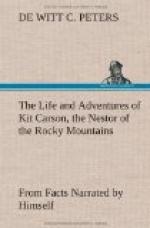hence, it became necessary to take instant measures
in order to insure the safety of the advance.
Kit Carson, who was the commander of the party, after
quietly surveying the scene, gave orders for the men,
with their animals, to conceal themselves, as best
they could in the brush. His orders had been
issued but just in time, for the concealment was barely
attained, when the Indians were upon them. They
were received with a well-directed volley from the
rifles of the little party, which brought down several
of the fierce assailants. They recoiled and retreated
for a moment. The moment was golden to the few
white men. Like men who were fighting for their
lives but who were cool in danger, they made no mistakes
in reloading their rifles. They were but just
ready, however, for the second charge. This time
the savages came on with unearthly yells and desperate
courage, seemingly well satisfied that before them
stood the men whose faithful rifle-talk they had heard
before. Kit warned his men to keep cool and fire
as if shooting game, a warning which was entirely
unnecessary, for the result was that the savages were
again driven back with a brave bleeding or dying for
nearly every shot fired. It was very fortunate
that Kit had chosen this position, for the engagement
lasted nearly the entire day. The loss on the
part of the Indians was very severe. They did
everything in their power to force Kit and his party
from their cover, but without avail. Every time
they attempted to charge into the thicket the same
deadly volley was poured in with never-failing aim,
which invariably caused the savages to beat a hasty
retreat. Before the next attack the trappers
were ready for them with reloaded rifles. At last,
as if driven to desperation, the Indians set the thicket
on fire, hoping to burn out their foes. Most
providentially, in this also they were foiled.
After consuming the outer shrubbery, the fire died
out. This was the last act attempted by the savages.
Seeing the ill-success of their effort to dislodge
the trappers by fire, they departed. They may
have been hurried in this leave-taking somewhat by
news brought in by their spies of the near approach
of the main body of the trappers, which had arrived
at a point about six miles distant from the battle
ground. They had been prevented from hearing
the reports of fire-arms by adverse winds, and knew
nothing of the fight until informed by the trappers
engaged in it. When sufficient time had elapsed
for the Indians to be well out of sight, Kit Carson
and his companions left their cover and soon found
their way into the camp of their friends.




